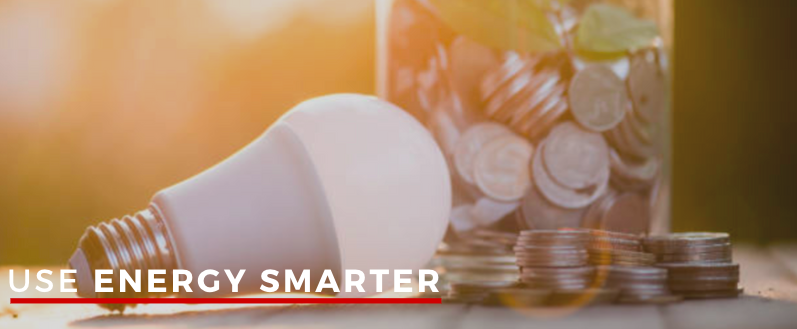
We know that energy efficiency is the quickest, cheapest, and cleanest way to meet our energy needs. Cutting energy waste lowers monthly power bills. But the state agency that sets energy savings goals for the state’s biggest utilities – the Florida Public Service Commission (PSC) – still uses badly outdated economic screening practices that have left Florida almost dead last in state rankings for efficiency.
The Commission’s efficiency policies have not been updated in almost 30 years. In fact, they are so outdated that no other state uses them for setting efficiency goals. It is time to bring Florida into the 21stcentury by using energy smarter.
It’s more important than ever to reduce power bills by making homes more efficient, safe, and secure while keeping the savings in our local communities.
With the Commission’s historical failure to set meaningful savings goals, Florida now has among the highest energy bills in the country. For too many of our neighbors, this means facing impossible choices between buying food or medicine or having power cut off.
Clearly, Florida’s efficiency goal setting process isn’t working. So let’s fix it.
The good news is that we have a rare opportunity to vastly improve Florida’s poor performance by reforming these antiquated practices. The Commission is now in the process of revising its goal setting rule, but its staff is not planning to address the fundamentally flawed, decades-old economic screening practices. Unless they do, utilities in Florida will continue to underinvest in energy efficiency.
That’s where you come in! The Commission needs to hear from you.
Take a moment to have your voice heard by sending a letter to the PSC, and feel free to personalize it as you see fit.
TAKE ACTION: SEND A LETTER TO THE FLORIDA PSC
SHARE YOUR STORY: WHY IS ENERGY EFFICIENCY IMPORTANT TO YOU?
With utility companies’ failure to invest in cutting energy waste, Florida now has among the highest energy bills in the country. For too many of our neighbors, this means facing impossible choices between foregoing food and medicine or having the lights cut off. With a staggering 600,000 households currently at risk of having their power shut off due to job losses and economic hardship from the COVID-19 pandemic, Florida’s dismal record on energy efficiency that if utilized would help save customers money is especially troubling.
The Florida Public Service Commissioners (PSC) – the agency that regulates the state’s largest utilities – recently opened a rulemaking docket to consider fixes to the goal-setting process. Unfortunately, the Commission’s staff has framed the rulemaking in very narrow terms, which means the roadblocks to more meaningful energy savings and programs could remain. That’s why the Southern Alliance for Clean Energy filed a Request for a Scoping Workshop(s) to encourage the Commission to get important input from the public, stakeholders, and experts in the field before rushing to revise its rule.
Join us in our call. Send a letter to the PSC today in support of a scoping workshop to finally address and modernize outdated practices that no longer serve the state or its citizens.
The current restrictive cost-effectiveness screening practices led to the gutting of energy efficiency goals in 2014 and most recently to zero, or near zero, energy efficiency goals being proposed by the state’s largest power companies. Clearly, Florida’s efficiency goal setting process isn’t working under current practices. That’s why every other state in the nation has abandoned relying on these bad practices for setting goals. The result is that (predictably) Florida ranks near the bottom of state rankings for capturing energy savings – both in the Southeast and nationally.
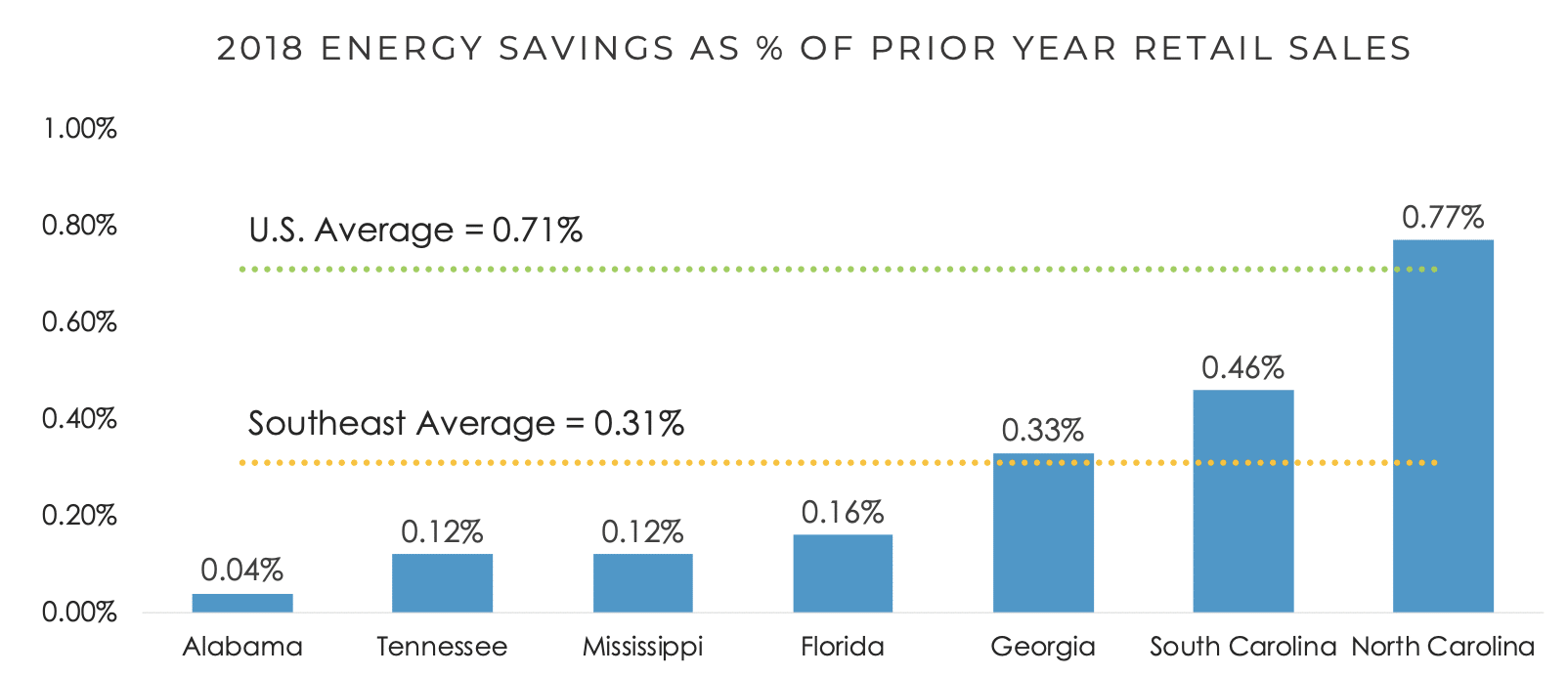
Florida’s cost-effectiveness screening practices work against the very intent of the underlying efficiency law that calls for reducing the growth rate of electricity consumption to protect the public health and prosperity of the state and its citizens.
WHAT IS FLORIDA DOING THAT IS SO WRONG?
- Using the Ratepayer Impact Measure (RIM) test as the primary basis for setting annual utility efficiency savings goals. Instead of treating customer energy savings as a benefit, the RIM test treats them as a cost – because the utility company receives less revenue. Since customer bill savings are the central reason for energy efficiency in the first place – the first problem is easy to see.
- Florida utilities automatically eliminate any efficiency measure with a return on investment (ROI) of less than two years. The most cost-effective and affordable efficiency measures are automatically eliminated.
Combined, the RIM test and two-year screen eliminate all of the most cost-effective energy efficiency measures – the ones that are commonly implemented by utilities across the country.
HOW ARE CUSTOMERS IMPACTED?
The economic fallout from the COVID-19 crisis has laid bare the prevalence of high-energy burden in our communities. More than 600,000 customers are behind on power bill payments just in the investor-owned utilities’ territories alone. No customer should have to make the choice between paying a power bill and essentials like food and medicine.
The good news is that we have a rare opportunity to vastly improve Florida’s poor performance by reforming these antiquated practices. Take a moment to have your voice heard by sending an email to the PSC:
Background
Last fall, clean energy advocates successfully encouraged the Florida Public Service Commission (PSC) to stop the backsliding on energy efficiency goals for the state’s largest utilities. The PSC kept the current goals in place for the next five years. Public outcry over the utilities’ efficiency goal proposals, including a dozen resolutions passed by municipal governments and a staggering 5,000 comments filed in favor of energy efficiency, clearly played a role in the Commission’s decision.
Earlier this summer, those same utilities filed energy efficiency program plans to meet the goals set for them by the PSC. There was a clear divide between the utilities on the ambition of their low-income programs. Staff recommended effectively scaling back the programs.
Thousands of hard-working Florida families got a reprieve July 7th when the Florida PSC, at its Agenda Conference, rejected its staff’’s recommendation to scale back utility energy efficiency programs. The cuts would have significantly impacted critical programs focused on our most vulnerable households.
At the same conference, it approved its staff’s recommendation to open a rulemaking docket to consider changes to the goal-setting process. Unfortunately, the Commission’s staff has framed the rulemaking in very narrow terms, which means the roadblocks to more meaningful energy savings and programs could remain. That’s why SACE filed a Request for Scoping Workshop(s) in the docket shortly after it was opened AND why the Commission need to hear from customers.
The need for meaningful programs is most urgent for low-income customers who disproportionately pay a higher percentage of their income on power bills. There are more than 5 million low-income individuals in Florida – 36.8% of the customers of the state’s electric utilities. These families pay a disproportionate share of their income for energy, creating an energy burden which is a roadblock to moving out of economic hardship. Addressing the problem of unaffordable bills is especially critical given the economic fallout from the COVID-19 crisis.
Why is Cutting Energy Waste Important?
ENERGY EFFICIENCY IS A PROVEN CLEAN ENERGY RESOURCE THAT HAS A CRITICAL ROLE TO PLAY IN REDUCING BILLS FOR HARD WORKING FAMILIES
Electric utility energy efficiency programs offset the need for traditional fossil fuel power plants and are key to reducing utility system costs paid by all customers on their monthly electric bills. Meaningful energy efficiency also cuts carbon emissions that worsen the climate crisis, threaten public health, and damage our environment. A number of Florida’s cities and counties have already embraced 100% renewable energy and climate emissions reduction targets. To achieve them, low-cost efficiency improvements are the smart first step.
FLORIDIANS ARE VULNERABLE TO ECONOMIC UNCERTAINTY, A PROBLEM COMPOUNDED BY THE COVID-19 PUBLIC HEALTH CRISIS
With reduced wages and higher energy bills, the coronavirus crisis is compounding an already serious problem of high energy burdens in Florida, where families are forced into untenable tradeoffs between paying their energy bills and purchasing essential basic needs like food and medicine.
However, the problem of unaffordable energy bills runs much deeper than the current crisis. That’s where investment in energy efficiency programs – especially in low-income efficiency programs – can help relieve customers’ energy burden by reducing household energy use and saving money on power bills.
The Covid crisis has laid bare the energy burden on Florida families. At a PSC workshop, it was revealed that at least 600,000 customers are behind on their electricity bills and at risk of disconnection largely due to the economic fallout from the COVID crisis. Investment in energy efficiency programs – especially low-income efficiency programs – must be part of the solutions conversation. Energy efficiency measures reduce a family’s energy burden by cutting energy waste and saving money on power bills.
Florida already has among the nation’s highest average monthly energy bills, in large part due to a historic failure by its electric utilities to adequately invest in energy efficiency. As a result, Florida’s working families, including those living month to month, are paying higher energy bills than customers in states with substantially more robust efficiency programs.
FLORIDA FAMILIES WANT TO SAVE MONEY ON BILLS
Florida’s largest utilities badly trail leading utilities in the Southeast and throughout the nation in delivering energy savings to customers. Leading states in our region invest in energy efficiency because it is the cheapest, cleanest, and fastest way to reduce demand for energy, which in turn reduces bills for all customers.
According to 2018 data, Floridians pay the 9th highest electricity bills in the country, and yet some of the utilities are doing the least to help hard-working families reduce energy use and save money on their bills. Let’s not leave energy savings on the table.
FLORIDIANS VALUE ENVIRONMENTAL PROTECTION
Energy efficiency is the cheapest, quickest, and cleanest way to tackle the challenge of a changing climate by reducing greenhouse gas emissions. A number of Florida’s cities and counties have already embraced 100% renewable energy and climate emissions reduction targets. To achieve them, low-cost efficiency improvements are the smart first step. The choices we make in the next decade will either lock us into a future of fossil fuel dependence or transition us toward a clean energy future. Energy efficiency has the power to replace dirty fossil fuels and decarbonize the energy sector.
FLORIDA FAMILIES VALUE MAKING THEIR HOME AND LOVED ONES MORE COMFORTABLE AND SECURE
Hardworking families that live month to month are most at risk for not receiving the information and financial resources they need to make their homes more efficient, comfortable, and secure.
FLORIDA IS AN OUTLIER WHEN IT COMES ENERGY EFFICIENCY GOAL SETTING
Energy efficiency is well known as the least-cost energy resource. But, Florida’s use of outdated cost-effectiveness tests and screening practices consistently (and predictably) lead to anemic energy-saving goals for Florida’s major utilities and poor efficiency performance compared to the rest of the country.
The Commission’s reliance on certain cost-effectiveness measure screening tests – which are singularly unique to Florida – such as the continued to reliance on the Rate Impact Measure (RIM) test does not allow for meaningful efficiency savings. The RIM test counts energy savings by customers as a “cost” on account of reduced utility sales, rather than a benefit – despite customer energy savings being the fundamental benefit of energy efficiency and the primary reason for investing in it in the first place.
Most recently, these outdated practices have led to zero, or near-zero, energy efficiency goals being proposed by the state’s largest power companies. Clearly, Florida’s goals setting process isn’t working under current practices. Let’s fix it.
CURRENT GOAL MAKING PRACTICES ARE OUTDATED
The outdated energy efficiency cost-effectiveness and screening tests used in Florida are nearly 30 years old. No other state in the country uses these practices, which are clearly in need of reform.
The Commission’s reliance on fundamentally flawed and decades-old efficiency practices is the direct cause of Florida’s poor performance on energy savings compared to the rest of the country.
Energy efficiency technologies, policies, and practices are dynamic. That’s why regulators across the country periodically modernize their approach. The Commission’s recently announced energy efficiency rulemaking provides a critical, once-in-a-generation opportunity for Florida to rewrite its efficiency practices for a more affordable, clean energy future.
OPPORTUNITY TO PAVE A MORE EQUITABLE FUTURE
Let’s not miss this opportunity to modernize the goal-setting process so that it works for hard-working families, including the utilities’ most vulnerable customers.
Timeline
January 14th: The PSC staff is holding a workshop on its draft rule on January 14that 1:00 pm. It must be the first of several workshops that provide meaningful opportunities for stakeholders and the public to engage in updating current practices. The PSC staff will ultimately propose a rule for adoption to the commissioners – likely in mid-summer.
RESOURCES
Blogs
Florida PSC Proposal Ignores Reforming Outdated Efficiency Practices
The Florida PSC could miss a unique opportunity to modernize its outdated practices for setting energy efficiency goals. The outcome of the current rulemaking process is of critical importance for families, businesses, and local communities.
High energy bills plague low-income Floridians
As Florida regulators allow utilities to disconnect power during the pandemic, SACE’s Board President, Leon Jacobs, urges us to get to the root of the problem.
Time for Florida to Join the 21st Century on Energy Efficiency
Remember the early 90’s? The internet had just become commercially available, businessmen clipped pagers to their belts, and kids were listening to the Backstreet Boys on cassette tapes. The Florida Public Service Commission’s practices for setting energy efficiency goals haven’t changed since then. They are frozen in time. Will they take an upcoming opportunity to change them?
Florida Public Service Commission Approves Expanded Low-Income Efficiency Programs
The Florida Public Service Commission rejected its own staff’s recommendation, which would have blocked the implementation of new and improved efficiency programs. The Commission also opened a rulemaking docket to change how efficiency programs and savings targets are set in Florida.
Energy Burden Relief: Now More Critical Than Ever
The coronavirus pandemic is already profoundly affecting our everyday lives and our sense of security – with significant economic impacts. No family should ever have to choose between paying an electric bill and putting food on the table.
Media
High energy bills plague low-income Floridians
As Florida regulators allow utilities to disconnect power during the pandemic, SACE’s Board President, Leon Jacobs, urges us to get to the root of the problem.
Florida power companies face legal challenge on disconnections during pandemic
During the course of COVID-19, Floridians like, Zoraida Santana, have been making the difficult choice of trying to minimize their family’s exposure to COVID-19 or continue working to keep the lights on. As utility disconnections are expiring and families are confronting their towering utility bills, energy advocates are calling for an emergency moratorium on utility shutoffs.
COLUMN: An open letter to Public Service Commission
A local ecologist in Port Charlotte concerned with utility efficiency and energy conservation writes an open letter to the PSC asking them to prioritize meeting customers’ service needs and our energy and greenhouse gas reduction goals by having better energy efficiency programs and rulemaking.
Come on, Florida. It’s Time to Help More Citizens With Energy Efficiency
It’s time for Florida to join the 21st Century on energy efficiency
The Public Service Commission must change its rules and help families reduce their utility bills. We must fix the problems that have plagued Florida’s energy efficiency goal-setting process for decades. The 1990s were good while they lasted, but it is time to move into the 21stcentury. Let’s not miss this opportunity to help hard-working families – including the most vulnerable – save money on power bills.
Utility Regulators Urged To Hold Workshops Before Rewriting Energy Efficiency Rules
Southern Alliance for Clean Energy calls on Florida utility regulators to gather public input before rewriting the state’s energy efficiency rules.
FPL, other Florida utilities far behind rest of US on energy efficiency, advocacy group says
“Florida utilities — in particular, NextEra Energy subsidiaries Florida Power & Light (FPL) and Gulf Power — are badly lagging the rest of the nation in commitments to energy efficiency, according to an analysis by the environmental advocacy group the Southern Alliance for Clean Energy (SACE). In absolute terms, FPL, the largest utility in the state by number of customers, saves less electricity through efficiency measures than other major Florida utilities, despite selling far more electricity, SACE wrote in the latest of a series of blog posts about the group’s annual report on energy efficiency in the southeastern U.S. The pandemic and recession have led business groups and consumer groups to call for cutbacks in energy efficiency programs to give utility customers temporary bill relief, a position that efficiency advocates have argued is shortsighted.”
State okays broader energy efficiency options for low-income Floridians
State regulators approved utilities’ plans for proposed energy conservation programs, several of which would help low-income customers save money on their power bills.
Covid-19 highlights the need for power companies to help low-income customers make their homes more efficient
In this op-ed, Zelalem Adefris of Catalyst Miami writes on the importance of comfort in your own home and the difficulty of keeping up with utility bills during this difficult time. Adefris explains that meaningful energy efficiency programs will increase Florida’s resiliency, help customers save money, and mitigate carbon pollution and the need to build more polluting power plants that contribute to climate change.
OUC Must Rethink Low Income Program – Commentary
Beverlye Colson Neal, president of the Orange County Branch of the NAACP, expresses the need for robust energy efficiency programs. The lost wages and jobs from the COVID-19 crisis are making it even harder for low-income people to pay already-high energy bills. Yet, the Orlando Utility Commission’s proposed energy efficiency program only serves 73 of the 72,000 vulnerable families who need it. Energy efficiency programs can provide real value to customers by helping them reduce energy and save money on bills. It’s a win-win for OUC as well because efficiency is the cheapest, quickest, and cleanest way to meet energy demands and help the City’s clean energy goals.
Additional Resources
SOCIAL MEDIA
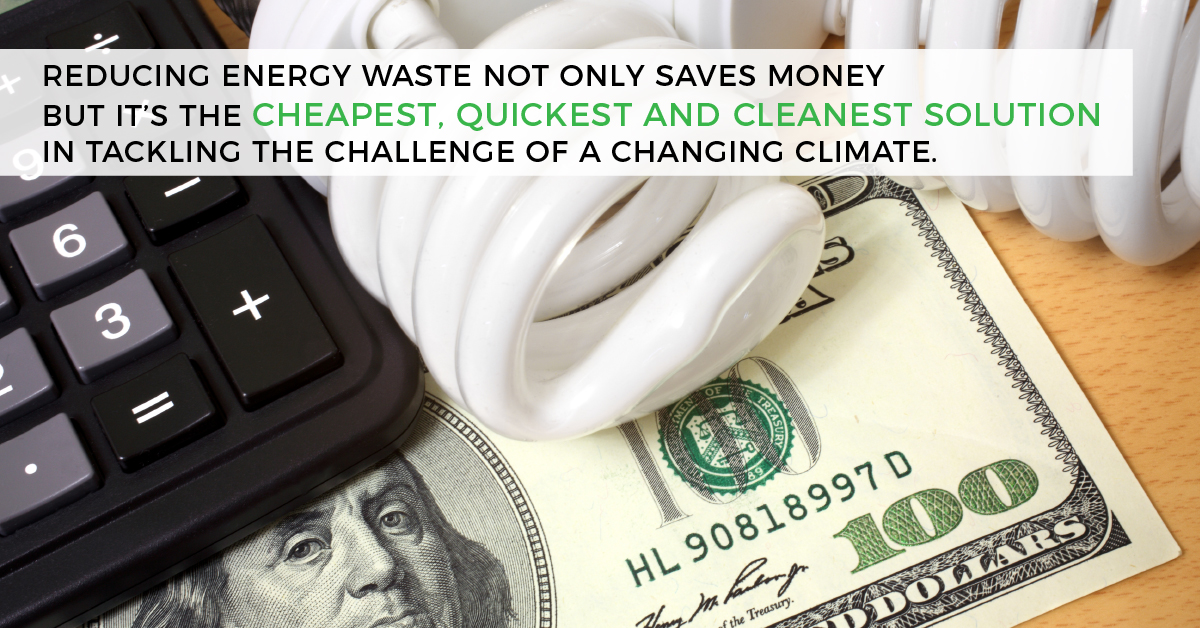
DOWNLOAD IMAGE
(image will open in a new tab — right-click and select “Save Image”)

DOWNLOAD IMAGE
(image will open in a new tab — right-click and select “Save Image”)
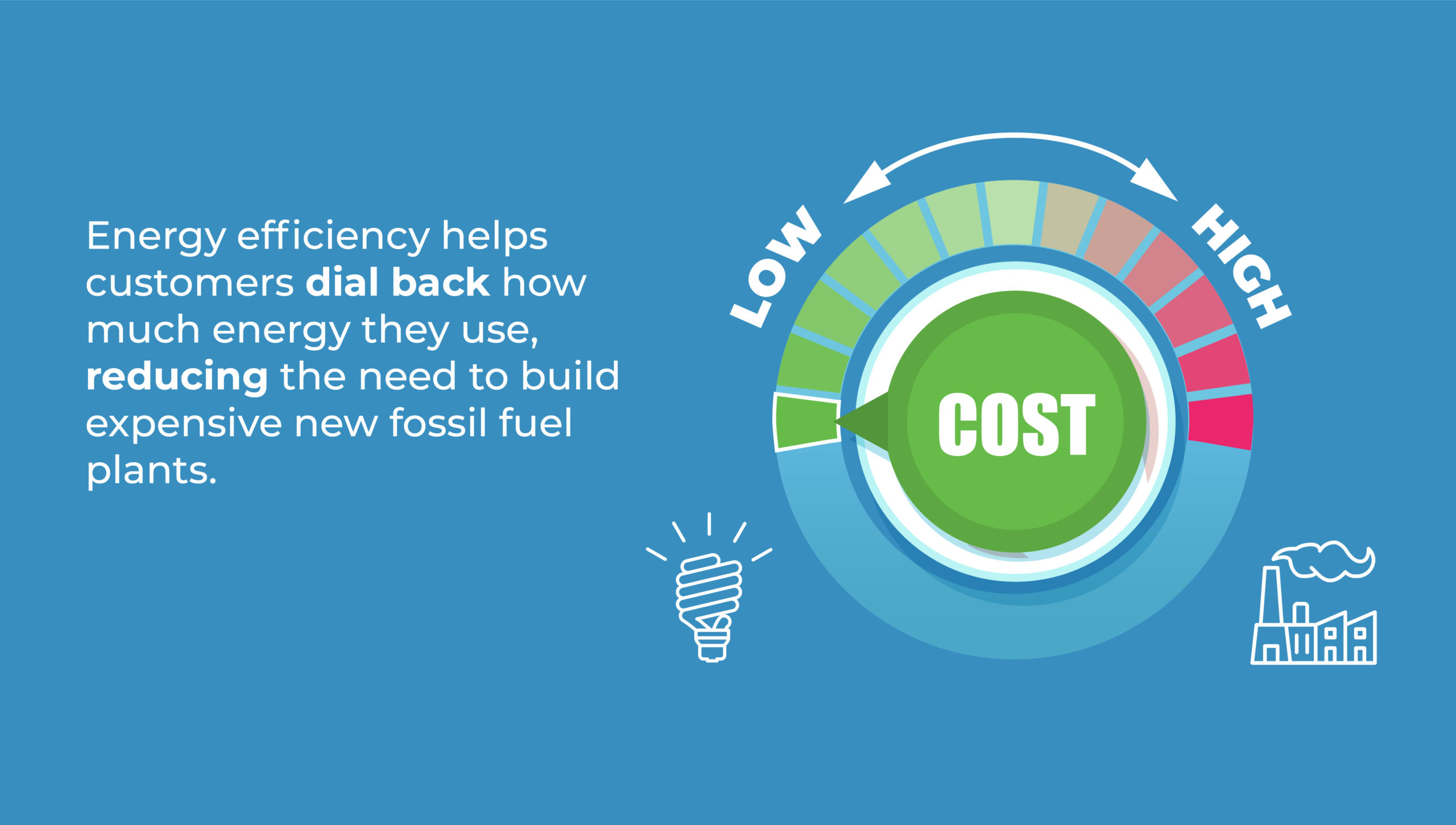
DOWNLOAD IMAGE
(image will open in a new tab — right-click and select “Save Image”)
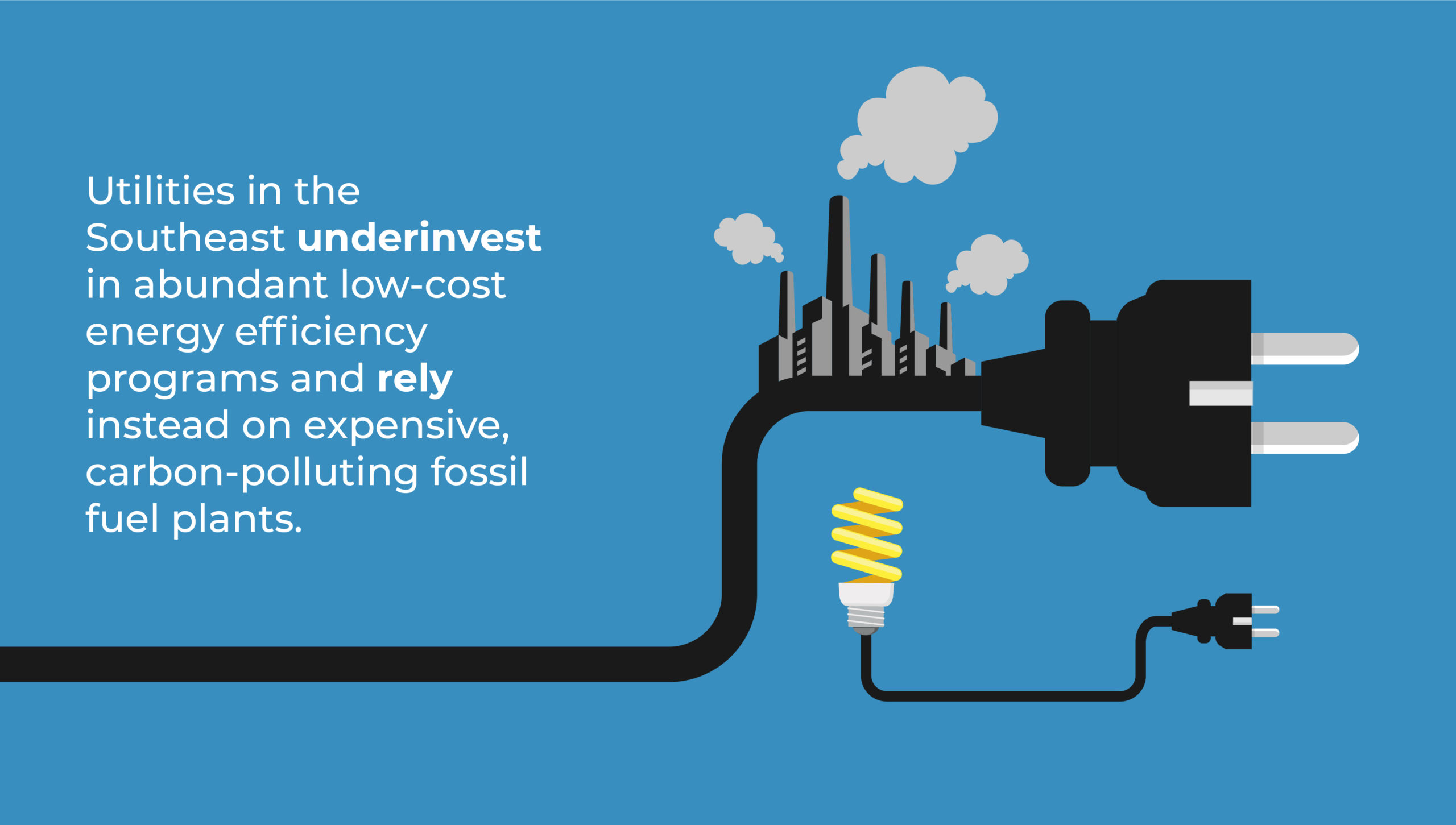
DOWNLOAD IMAGE
(image will open in a new tab — right-click and select “Save Image”)

DOWNLOAD IMAGE
(image will open in a new tab — right-click and select “Save Image”)
Technical Resources
Florida is already well below national and Southeast averages for energy savings (helping customers reduce energy waste through energy efficiency programs). It is almost at the bottom of state rankings for energy efficiency performance, capturing only .16% savings as a percentage of annual sales. That’s a weak number compared to the national average of .77% and the Southeast average of .31%. SACE’s “Energy Efficiency in the Southeast” 2019 report shows that Southeastern states and utilities continue to rely on expensive, outdated, carbon-polluting fossil fuel power plants while underinvesting in abundant low-cost efficiency resources.
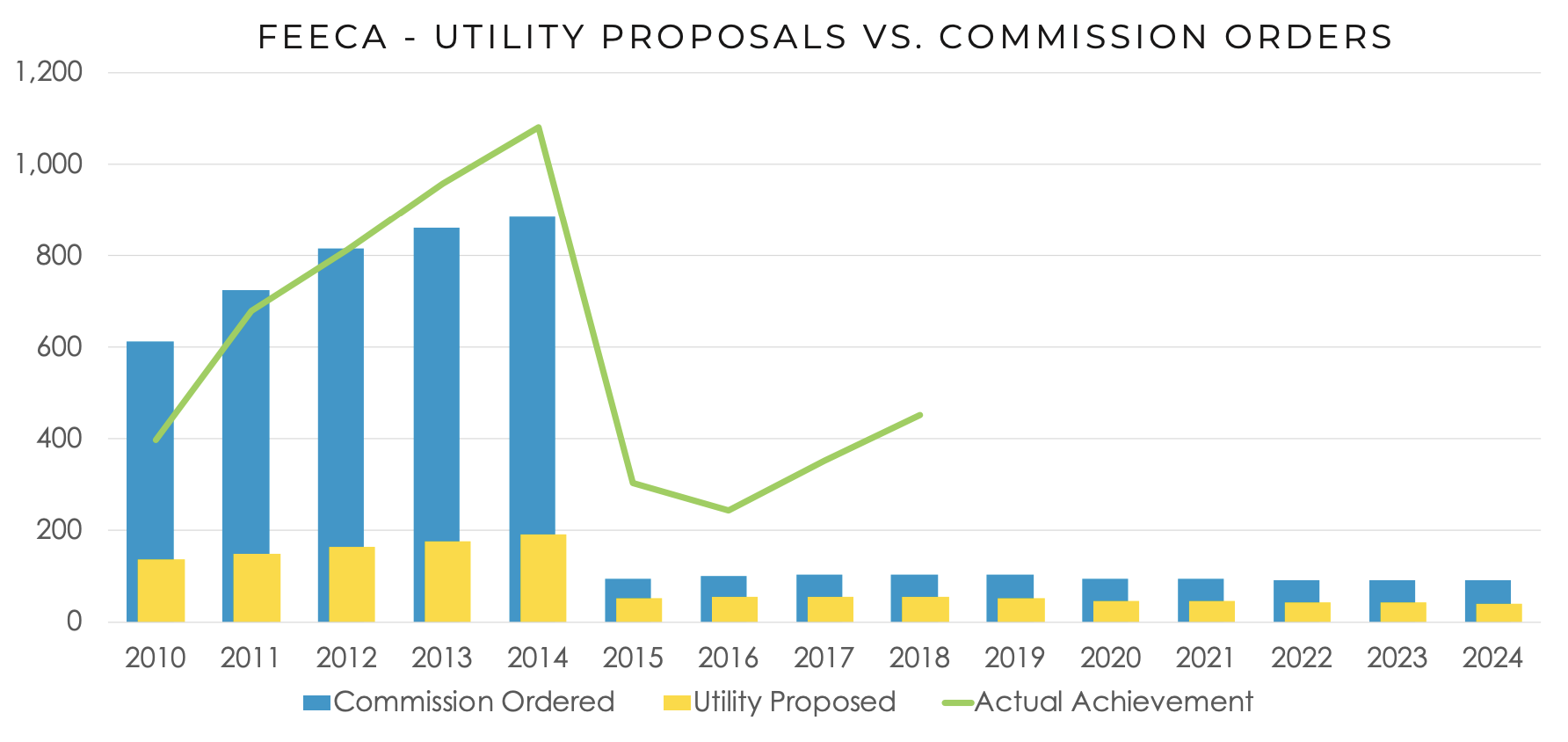
Additional Blogs
Southeast Utilities Falling Behind: ACEEE Efficiency Scorecard Confirms What SACE Already Knew. Nowhere to Go But Up!
The efficiency performance of most major utilities in the Southeast lags far behind the rest of the nation in ACEEE’s 2020 Utility Energy Efficiency Scorecard. Florida’s use of the deeply flawed Ratepayer Impact Measure (RIM) test to eliminate nearly all cost-effective efficiency measures (no other state uses the RIM test in this way) helps explain why FP&L was ranked at the very bottom of the worst-performing utilities in the country. By contrast, Duke Carolinas, Duke Progress, and Georgia Power each performed better. These utilities have more rigorous Commission oversight, more active stakeholder engagement, and receive generous financial incentives for higher efficiency performance.
Energy efficiency slows climate change, saves money. Why haven’t we embraced it more?
The choices we make in the next decade will either lock us into a future of fossil fuel dependence or transition us toward a clean energy future. Energy efficiency has the power to replace dirty fossil fuels and decarbonize the energy sector.
“Energy Efficiency in the Southeast” 2019 Annual Report
SACE’s “Energy Efficiency in the Southeast” 2019 report shows that Southeastern states and utilities continue to rely on expensive, outdated, carbon polluting fossil fuel power plants while underinvesting in abundant low-cost efficiency resources.
Bill Relief Resources During COVID-19
For as long as this public health threat exists, no Floridian should have their electricity turned off because of an inability to pay. Find resources to help you pay your energy bills during this difficult time at ConnectedInCrisis.org.